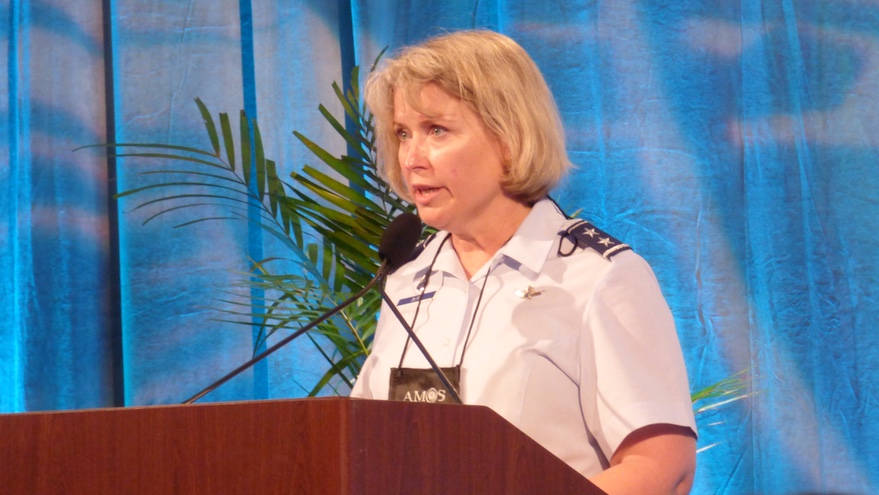WAILEA, Hawaii — A Space Force general endorsed the development of commercial systems for removing space debris, saying they can address congestion in Earth orbit without the policy concerns a government-run alternative might have.
Maj. Gen. DeAnna Burt, vice commander of the Space Force’s Space Operations Command, told an audience of space traffic management experts that active debris removal is essential to address the growing population of objects in low Earth orbit that pose a threat to government and commercial satellites.
“We need to pick up debris. We need trash trucks. We need things to go make debris go away,” she said in a keynote at the Advanced Maui Optical and Space Surveillance Technologies, or AMOS, Conference here Sept. 15. “I think there is a use case for industry to go after that as a service-based opportunity.”
Burt, who is also commander of the Combined Force Space Component Command of U.S. Space Command, said that concern was driven by the inability to do anything if there is a threat of a collision between two non-maneuverable objects, like debris. “Those are bad days,” she said, within nothing to do other than hope that the predicted conjunction passes without any new debris objects tracked.
Later in her presentation, she emphasized that orbital debris removal was not only important, but also should be done by the private sector. “Absolutely there’s a business case for debris removal for industry,” she said.
Orbital debris is a job for companies, she said, because a government-led effort would cause some to believe the technology would also used as a weapon to disable active satellites. “When you say the military is going to develop a capability to pick up trash or pick up debris, it’s automatically seen as dual use,” she said.
A company, or consortium of companies, that attempted orbital debris removal would be “very valuable,” she concluded. “It is a growing discussion on the international stage as well. I think it will get solved in the next few years, but we definitely want to see more of that technology.”
Several companies have expressed an interest in orbital debris removal, including projects to demonstrate technologies needed to capture and deorbit objects. However, they face other stumbling blocks, from uncertain regulatory regimes for removing debris to identifying who will pay for debris removal, and how much.
Debris removal fits into a broader picture of space traffic management or, as she described it, space traffic awareness. The difference is that, unlike air traffic management, where there are clear authorities and regulations for directing aircraft, the Space Force has little ability to direct operational, or live, satellites to maneuver if it identifies a potential collision.
“If that live object is a DOD capability, then absolutely I have the authority to tell them, ‘you need to move and here’s direction you’re moving,’” she said. “If that object is anything other than a U.S.-flagged Department of Defense asset, I am making them aware there is a collision, but it’s their choice what they do.”
She supported efforts to transfer civil space traffic management to the Commerce Department. “We, as the Department of Defense, look forward to the Department of Commerce taking on this mission and standing up,” she said. “We stand shoulder to shoulder to help them to do that and to be successful.”
Handing those responsibilities to Commerce Department, she argued, would better separate civil and military roles, allowing Space Command to focus on “battlespace awareness” including fighting a war that extended to space.
“We will continue to do the space traffic awareness mission until we are told not to and the Department of Commerce is fully up and capable,” she said. “But we want them to be successful because we need to get out of that business because the threat is growing. It is critical that, to normalize this domain, we continue to work in that direction.”
